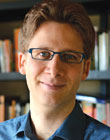2011 Janet Taylor Spence Award
Thomas L. Griffiths
University of California, Berkeley
 What is the focus of your award-winning research?
What is the focus of your award-winning research?
My research explores mathematical models of human cognition, trying to understand how people do things like learn categories, causal relationships, and languages, and how we can make computers do likewise. My approach focuses on how we can understand human learning by thinking about the abstract computational problems that underlie these capacities and the ideal solutions to those problems. In particular, much of my work uses ideas from probability theory and Bayesian statistics to make sense of the inductive leaps that people make whenever they need to draw conclusions from limited data, which is a common element in all of these forms of learning. These statistical ideas provide a set of tools for analyzing human learning, and a link to research in computer science on artificial intelligence and machine learning.
How did you develop an interest in this area?
I went to university wanting to learn about all the things we know the least about, such as the human mind. A couple of years into my degree I took a philosophy class that used a book about neural networks, which got me excited about the prospect of using math to model human cognition. I spent that summer reading everything I could get my hands on about mathematical models of cognition, and devising grand theories of the mind. I figured out that Mike Kalish, University of Louisiana at Lafayette, was the person I should talk to about this at my university, and I pinned him down in a hallway at 9 a.m. on the first day of classes to express my enthusiasm. Despite this, he let me work in his lab, where I learned a lot more about statistics and computer programming and got on the path to grad school.
Who are your mentors and/or biggest psychological influences?
Mike Kalish, University of Louisiana at Lafayette, and Stephan Lewandowsky, University of Western Australia, introduced me to cognitive science, and we recently started working together again on a project exploring how information changes when it is passed from person to person. I applied to Stanford for grad school hoping to work with Roger Shepard, Stanford University, and David Rumelhart, not knowing that neither was taking students. I was lucky enough to have my folder pulled from the stack by Josh Tenenbaum, Massachusetts Institute of Technology, who was a great advisor. Since then, Rich Shiffrin, Indiana University, and Rich Ivry, University of California, Berkeley, have been generous mentors and advocates.
In terms of influences, the approach of thinking about the abstract computational problems underlying cognition was championed by Roger Shepard, Stanford University, and David Marr. John Anderson, Carnegie Mellon University, and Nick Chater, University College London, UK, were both early proponents of using “rational” models to understand human cognition, and I often find myself rediscovering things that they first thought about years earlier.
What unique factors have contributed to your early success?
I have been lucky enough to work on a “hot topic,” with interest in ideas from Bayesian statistics having grown in psychology and other disciplines. I have also had a great set of collaborators, labmates, and students, which has made it possible to explore a broad range of topics, and made doing research even more enjoyable!
What does winning this award mean to you both personally and professionally?
I am honored to be included in what is already a distinguished list of recipients. Despite focusing on connections to statistics and computer science in my research, my training has all been in psychology, so it is wonderful to be receiving an award from this community.

